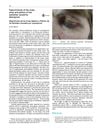 19 citations,
March 2003 in “Journal of Investigative Dermatology”
19 citations,
March 2003 in “Journal of Investigative Dermatology” Mechlorethamine treatment regrew hair in mice by killing immune cells causing hair loss without harming hair follicles.
 15 citations,
February 2018 in “Journal of Cosmetic and Laser Therapy”
15 citations,
February 2018 in “Journal of Cosmetic and Laser Therapy” Laser-assisted drug delivery improves hair loss.
 11 citations,
April 2020 in “Journal of Dermatological Treatment”
11 citations,
April 2020 in “Journal of Dermatological Treatment” Taking oral isotretinoin with creams worked better for treating a type of hair loss than creams alone.
 11 citations,
February 2020 in “Dermatology and therapy”
11 citations,
February 2020 in “Dermatology and therapy” Low-Level Light Therapy significantly reduced inflammation and promoted hair regrowth in patients with Lichen planopilaris.
 8 citations,
June 2019 in “Pharmaceutical research”
8 citations,
June 2019 in “Pharmaceutical research” Applying heat with certain chemicals can greatly improve how well isotretinoin gets into the skin through hair follicles.
 8 citations,
November 1990 in “International Journal of Dermatology”
8 citations,
November 1990 in “International Journal of Dermatology” Albendazole may cause hair loss.
 7 citations,
July 2011 in “Survey of Ophthalmology”
7 citations,
July 2011 in “Survey of Ophthalmology” The document concludes that periocular hair disorders have various causes and treatments, and proper evaluation by specialists is important for management and prognosis.
 6 citations,
May 2023 in “Drugs”
6 citations,
May 2023 in “Drugs” Baricitinib helps regrow hair in adults with severe alopecia better than a placebo and is approved for treatment, but long-term effects are still unknown.
 5 citations,
April 2019 in “Dermatologic therapy”
5 citations,
April 2019 in “Dermatologic therapy” Secukinumab for psoriasis unexpectedly caused increased hair growth in a patient.
 5 citations,
February 2015 in “Dermatologic Surgery”
5 citations,
February 2015 in “Dermatologic Surgery” Two cases of a rare skin condition were successfully treated with laser therapy, offering a non-surgical treatment option.
 5 citations,
July 2014 in “Actas dermo-sifiliográficas/Actas dermo-sifiliográficas”
5 citations,
July 2014 in “Actas dermo-sifiliográficas/Actas dermo-sifiliográficas” Latanoprost eye drops caused excessive hair growth and eyelash whitening in a woman.
 3 citations,
March 2014 in “Annals of Hepatology”
3 citations,
March 2014 in “Annals of Hepatology” A man lost all his hair after stopping hepatitis C treatment and it didn't grow back.
 3 citations,
June 1987 in “British Journal of Dermatology”
3 citations,
June 1987 in “British Journal of Dermatology” Nifedipine may help treat perniosis, improving symptoms and clearing lesions for some patients.
 2 citations,
March 2020 in “Skin”
2 citations,
March 2020 in “Skin” Using cidofovir cream for a rare skin disease can cause skin darkening.
 2 citations,
March 2019 in “Experimental Techniques in Urology & Nephrology”
2 citations,
March 2019 in “Experimental Techniques in Urology & Nephrology” Heptaminol may cause hair lightening in hemodialysis patients.
 2 citations,
April 1981 in “International Journal of Dermatology”
2 citations,
April 1981 in “International Journal of Dermatology” No treatment reliably changes Alopecia Areata's course; reassurance and possibly a wig are recommended.
 1 citations,
January 2015 in “Actas dermo-sifiliográficas/Actas dermo-sifiliográficas”
1 citations,
January 2015 in “Actas dermo-sifiliográficas/Actas dermo-sifiliográficas” Latanoprost eye drops caused excessive cheek hair growth and eyelash whitening in a woman.
 1 citations,
July 2014 in “International Journal of Dermatology”
1 citations,
July 2014 in “International Journal of Dermatology” A cancer patient developed a type of hair loss after starting a cancer drug called vandetanib.
 1 citations,
February 1954 in “Journal of the American Geriatrics Society”
1 citations,
February 1954 in “Journal of the American Geriatrics Society” Steroid hormones can help treat aging issues and improve health in elderly people.
 January 2018 in “Springer eBooks”
January 2018 in “Springer eBooks” Lasers are FDA-approved for permanent hair reduction, not removal, and more research is needed to improve treatments.
 January 2024 in “International journal of advanced biochemistry research”
January 2024 in “International journal of advanced biochemistry research” The dog fully recovered from demodicosis after treatment with Bravecto and supportive care.
 120 citations,
October 2004 in “International journal of radiation oncology, biology, physics”
120 citations,
October 2004 in “International journal of radiation oncology, biology, physics” Higher doses of cranial irradiation are linked to permanent hair loss.
 111 citations,
March 2012 in “Expert Opinion on Drug Delivery”
111 citations,
March 2012 in “Expert Opinion on Drug Delivery” Liposomes could improve how skin care products work but are costly and not very stable.
 106 citations,
July 2013 in “Advances in wound care”
106 citations,
July 2013 in “Advances in wound care” UV radiation can help sterilize wounds and promote healing but requires careful use to avoid damaging cells.
 91 citations,
April 2011 in “Journal of Ethnopharmacology”
91 citations,
April 2011 in “Journal of Ethnopharmacology” Polygonum multiflorum extract helps grow hair by activating certain hair growth signals in mice.
 54 citations,
August 2009 in “Dermatologic Surgery”
54 citations,
August 2009 in “Dermatologic Surgery” Modern hair transplants use small grafts for a natural look and drugs to prevent further loss, with high patient satisfaction.
 50 citations,
March 2000 in “American Journal of Clinical Dermatology”
50 citations,
March 2000 in “American Journal of Clinical Dermatology” Alopecia Areata has no guaranteed treatment for hair regrowth, but options like corticosteroids and minoxidil are used, with future research focusing on genetic and immune therapies.
 49 citations,
April 2000 in “Journal of The American Academy of Dermatology”
49 citations,
April 2000 in “Journal of The American Academy of Dermatology” Despite progress in treatment, the exact cause of Alopecia areata is still unknown.
 43 citations,
January 2013 in “Indian Journal of Dermatology, Venereology and Leprology”
43 citations,
January 2013 in “Indian Journal of Dermatology, Venereology and Leprology” The article concludes that advancements in hair cosmetics require dermatologists to stay informed about products and their potential risks, including allergies and higher risks for hairdressers.
 41 citations,
August 2007 in “European Journal of Gastroenterology & Hepatology”
41 citations,
August 2007 in “European Journal of Gastroenterology & Hepatology” A woman's total hair loss from hepatitis C treatment grew back after stopping the medication.





























